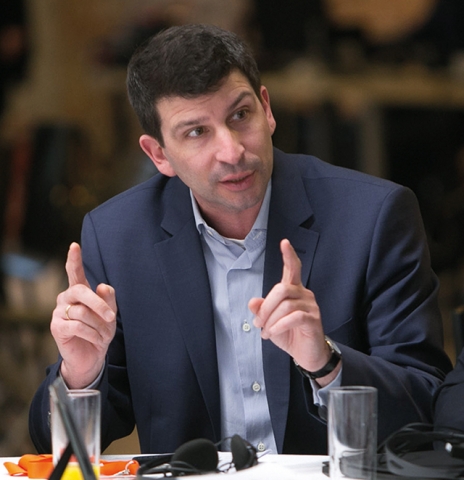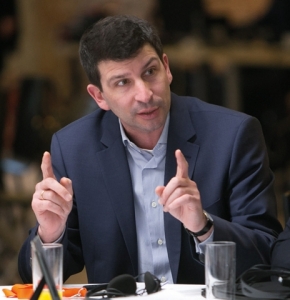GT Live Interviews Meets Austrian Ambassador in First of ‘Ambassadors Go Live’ Series
Exclusive interview
Katie Ruth Davies, Editor-in-Chief of Georgia Today, welcomed GT readers, and now viewers, to GEORGIA TODAY’s latest product ‘GT LIVE INTERVIEWS,’ kicking off with “AMBASSADORS GO LIVE,” where we’ll be meeting a number of diplomats to discuss, among other things, their countries’ approach to combating the coronavirus, how they view Georgia’s efforts in this regard, and their perspective on the future, post-COVID.
In the first interview, we met Austrian Ambassador to Georgia, Arad Benko. Ambassador Benko has been in Georgia since 2016 and before that worked as Ambassador to Latvia, and in positions of diplomatic importance in Vienna, Tel Aviv, Brussels, Bucharest and Bonn.
The timing of this interview is quite apt, as it was reported that just this week, a telephone conversation took place between the health ministers of our two countries- Austria and Georgia- in which Austrian Minister Anschober praised Georgia’s handling of the pandemic. And he is not the only one to have done so.
Before we meet Ambassador Benko, here are the latest COVID-19 statistics from his home country Austria, which is 83,879 km² and has a population of 8.859 million.
According to Worldometer, Austria has 2,043 active corona cases, of which 131 are critical. 580 Austrians have died and 12,779 have recovered. Total cases currently stand at 15,402.
What steps have you taken in your own life to protect yourself and those around you?
Well, my life has changed considerably, as it has for all of us. The biggest shock for me was not being able to go out and visit my friends, relatives and collegues anymore, or my favorite restaurants, at least not as often as before. That is something very personal for me. I stick to two main rules: wearing masks and social distancing. When I’m at home, I either read, do some gardening, or play pool-billiards.
Tell us what steps your country’s government and healthcare system have taken to fight COVID-19, and how effective you think that fight has been.
In mid March, when the pandemic was not so severe in Austria and the number of infected people stood at 300 or 400, we had already introduced a full lockdown. Towards the end of March, the numbers began to rise exponentially to reach their peak, however, the lockdown measures proved successful in the end, and the numbers began to fall back already in the beginning of April.
The timely lockdown measures helped the situation greatly, and the healthcare system has not been overwhelmed. This was the main point for us. We were quick to react as we had the picture of what happened, for instance, in Northern Italy, which is so near to Austria.
Right now, we have a daily increase of 0.5% in the number of infections, which is very, very low.
So you’re feeling positive that you’re overcoming the virus?
We had a stricter lockdown than here in Georgia for four weeks in Austria; people were considerably less allowed to leave, and most economic activity was halted, but it proved very productive in terms of lowering the number of infections. Already on April 14, we reopened 75% of our shops, and are still not seeing any significant increase in the number of infections. We have been successful also because people continue to wear masks and practice social distancing.
How much was it the government’s involvement versus social responsibility in people staying at home?
From the start, Austrian people supported the government’s decisions; they understood that being responsible had become a matter of life and death. Since the very beginning of the pandemic until now, when the restrictions had already been relaxed, the public approval of the government’s decisions has been standing at roughly 90%.
If you could go back in time, what would you do/recommend be done differently?
Not much. Governments in both Georgia and Austria have acted very quickly and effectively compared to other countries. In Austria, we now have the smallest daily increase of infections in all Europe. In Georgia, too, the extremely low numbers of infected and deceased prove the effectiveness of the government’s actions.
Many publications, both in the US and Europe, have over the past month praised Georgia’s handling of the pandemic. From what you’ve read or heard, what’s your take on that?
And rightly so. I already mentioned that the numbers of infected are really low in Georgia. They are a bit different than our numbers though. The main difference is perhaps that in Austria we had a more school-book figure, the peak of infections and their subsequent lowering, while in Georgia the process has been more erratic, I think due to the limited capability for mass testing.
I think the Georgian government did a great job with closing schools very early, limiting air traffic; even after the Easter holidays that we were all so afraid of, the country did not see a significant increase in the number of infections because people fortunately realised that it would not be wise to gather together in churches, and that they could pray from home.
Another huge indicator of Georgia’s success in fighting the pandemic is the many Georgian donors who have transferred so much money to the international funds.
Has any decision been made in regards to reopening the Austrian tourism sector to foreign guests?
The tourism sector makes up 15% of total GDP in Austria, so it is extremely important for the country’s economy. The hotels are set to open on May 29, but you would not imagine many tourists travelling in the near future. So there is no real solution to some of the economic problems that will remain even after the virus is gone. Some restaurants, some hotels will not survive. The government is doing its best to help those in need, to help with loans and so on. But in the end, the tourism sector will only be open once borders are open, and we don’t know when that will be.
I think that by June some of the flights will be coming back, but the question is: who will be flying? We have no idea when people will want to fly again.
What is your country doing to support its citizens, especially those who lost their jobs due to the pandemic?
We have about 600,000 unemployed in Austria at the moment, and we have 1.1 million people who are on part-time work, with the government paying part of their salaries, in order to enable the companies to take them back later. Immediately following the lockdown, the government decided to put together a EU 38 billion worth funding package, quite similar to that of Georgia, to support the companies and workers who lost their jobs. It’s just that in Austria, it was done in one gigantic step.
Yesterday, the Austrian government announced that there will be tax reductions for employees; there were three main areas identified for state investment: climate production, digitalization and regionalization.
How do you see your country in 6 months/ 1 year’s time? How can the economy recover?
As I said, it will be extremely difficult to restart the economy. Once we put it on the rails again, what kind of energy shall we give it to move on? Many economic hardships will surely ensue.
I think it will take much more than a year to fully recover from this crisis.
Austria is already taking its first steps toward the recovery. We wanted to reopen the schools in September, but this would mean six months of no school, and could have had a graver impact that we could have foreseen. The pressure from our citizens to reopen the schools has also been high. The schools will reopen on May 16, and this will be primarily beneficial for those children who do not have enough support or comfort to study at home. Online classes cannot be so effective because schooling is not just about learning, it is also about meeting your friends, communicating, playing games.
When will Austria open its border to non-EU countries, in your opinion? Will there be a special attitude towards non-EU countries as opposed to EU countries?
In Austria, we are considering first of all to open the border to our neighboring countries, for two reasons: first of all, we want to offer our hotels to our neighboring countries because if they can come, we then can better alleviate the strain on the tourism industry. We also need the workforce from the neighboring central-east European countries to help us with the daily work, for instance in the centers for the elderly.
We may also privileges for the countries with satisfactory and reliable statistics, such as the country of Georgia, which has been able to keep the number of infected people low.
What do you think can be done to make the recovery of the economy happen faster in Georgia?
The most important thing is ownership. I have been living here for four years now, and often I am very impressed at how responsibly Georgians can behave; at other times I’m not so sure. But in this situation particularly, I’m impressed with how seriously Georgians take the need to stick to social distancing and wearing masks.
I also think that the easing of restrictions can be done a bit faster in Georgia; I think it’s possible to reopen some shops, start slowly and see how people take it, whether they will respect their social responsibility.
International donors have invested huge amounts of money in Georgia’s future, in Georgia’s ‘European way’. With such support, it should be possible for Georgia to survive the coming months. The very important issue will be that the money be spent transparently, in order for the Georgian government to maintain the high credibility that it has achieved so far. Credibility is very important. I trust Georgians for their resilience; they have survived and endured so much; I am confident that the country will survive this crisis.
This terrible situation is also an opportunity for Georgia. There are many things that Georgia can learn; there are opportunities that the government will hopefully use, and it can always be sure that international donors will support the cause.
Transcribed by Elene Dzebisashvili












